Loan Modification VS Short Sale When Underwater On Your Mortgage

There are several choices for what you can do if you’re underwater on your home, or delinquent in your mortgage payments. A couple of the most famous choices are: negotiating Loan Modification or completing a Short Sale. The the case of Loan Modification ( in case that it’s successful) is you will have the ability to keep your home. In case of a short sale is that you get from the mortgage duty – with tens of tens of thousands of dollars of debt forever written off by your lenders, in the majority of instances. Do you understand which option is right for you?
First things first. What the issue is with your mortgage.
There are just two primary matters that might be going wrong with your mortgage(s). One is that you’ve issues with cash flow – added expenses, or either reduced income – that are making it almost impossible to make your mortgage payments. You’re either behind on your own mortgage payments, or you will shortly become delinquent on those payments.
The other potential issue is equity. Maybe you’ve got the cash flow to carry on making payments – but your house is under-water. You owe more on your own mortgage(s) than what the house could be worth. You’re wondering whether it’s truly worth it, to continue throwing money into a sinking boat.
Many folks these days have these two issues. Reduced cash flow means they are having problem making their monthly mortgage payments. As well as the fall in the value of their house also means they are underwater with their mortgage – so selling the house, at least through a conventional property sale, isn’t even an alternative.
A loan modification may work best in case the issue is cash flow.
In case the issue is cash flow – you have favorable equity in the house – then it might be worthwhile looking into a loan adjustment. The purpose of loan modification would be to renegotiate your mortgage loan by means of your lender in order for your own monthly payments become lower, making them much more manageable.
Your lender will offer one of the following for a loan modification
- a lower rate of interest rate
- adding unpaid interest to the principal balance
- Lowering the principal balance
- Expanding the duration of the loan.
Although the most helpful result for the borrower would be having the principal balance owed reduced by the lender, this virtually never occurs through a loan modification. Some of the very ordinary things a lender will offer would be to lower your own monthly obligations by extending the duration of the loan (in other words, by lengthening how many years you must pay it away). It’s going to raise the overall sum you pay by thousands, or even tens of tens of thousands of dollars while this reduces your own monthly premiums. Ensure that you completely understand the conditions, as well as the long term price, of any loan modification offered to you personally before you consent to it.
And be-careful: a rather high percentage of loan modifications end up failing because the homeowners eventually end up going into default all over again. You must be absolutely positively sure you will have the capacity to afford the new payments for the years to come before you register for a loan modification, or you also might eventually be part of those numbers.
In the event you are underwater, but might manage the payments, you’ve got several choices.
In case your house’s value has dropped so that at this point you owe more on your own mortgage(s) than what it’s worth, however you can manage your own monthly payments, you most likely Won’t be eligible for a loan modification. And also you might not believe that you’ve got some immediate trouble, because you’re making your payments. Nevertheless, you’re effectively throwing hard-won cash with an asset which has value that is negative to you personally. It is best to do a few computations, and find out whether you’d do better placing your cash elsewhere.
We talked about this in our site post before this month, about the best way to learn whether it’s rewarding to short sale your house that was underwater. We used as an instance a homeowner who owes $250,000 on a house which is now worth $200,000, and we supposed that her house would appreciate at a steady 3.9% per year for the foreseeable future. In that case, her house cost wouldn’t even grow to a value of zero equity until the year 2019. Over that time, she’d have paid over $115,000 in mortgage asset that, after all those payments, has zero value to her! a payments – on
Instead, if our homeowner got from her mortgage now by doing a short sale, and located rental lodging that’s more affordable than her mortgage payments, she could have been pocketing the difference, spending it on other things or maybe saving it for a down payment on a brand new house.
Thus, if you’re underwater in your mortgage, it’s well worthwhile to do the computations now, before any more cash has slumped in your mortgage payments. We’ve developed a “Short Sale Break Even” Calculator, where you are able to run your own numbers: using your home’s current value, and how much you really owe on it, and trying out different values for how much you really believe house prices will increase.
Once you’ve run the numbers, and computed how many years it’ll take you to return to a zero equity scenario, and how much you are going to have paid into your mortgage over that point, you can choose for yourself: continue making payments, or go for a short sale. A lot of folks are surprised to discover that, by getting rid through a short sale of their house, they end up hundreds of tens of thousands of dollars ahead over the future, compared to making mortgage payments on a negative strength for every one of these years.
Try our calculator out, and see for yourself, in the event you are really having trouble making your mortgage payments and you’re underwater on your home.
It is a difficult one – and, together with the present economic crisis causing a fall in house values as well as both wage reductions, it’s sadly a common one.
In the event you are having cash flow difficulties ( for instance, as a result of job loss or wage reductions, or due to increased expenses like medical bills), it’s simple to get behind on your own mortgage payments. Unless you understand that those issues are temporary (e.g. that you’ll shortly be returning to work, or that you’ll shortly be receiving some payment such as a cash settlement or inheritance), you need to do something right away. There’s absolutely no point in placing statements in your charge cards if there’s no end in sight, or using your retirement savings: you just make your situation worse.
Subsequently selling the house through a conventional sale isn’t an option, in case you are also underwater on your mortgage. You almost certainly will not qualify for a loan adjustment either – and even if you do, it’s improbable that the new payments will be low enough that they’ll truly alter your ability to pay (believe it or not, in some situations the new payments are even higher!). Odds are that in attempting to negotiate loan modification, when you invest will just eat up time you might have used to negotiate the one option that may work for you: a short sale.
It’s simple to get caught up in attempting to keep the house no matter what. But it’s important to be unrealistic to squander time on desperate choices which have little likelihood of succeeding.
Everyone’s situation is different, and it’s also vital that you simply get guidance from a professional who’ve reviewed your personal scenario. Yet, that said, if you’re experiencing trouble making your mortgage payments (either delinquent, or at danger of defaulting) and if you’re underwater in your mortgage, odds are that a short sale is your only realistic alternative for preventing foreclosure.
Don’t sit there in in a depressive state. Act immediately!
You need to start looking at your choices the minute that you simply understand you could be in financial trouble.
You’ve got a better chance of having the ability to negotiate a successful loan adjustment should you get in touch with your lender before you truly get behind on your own mortgage payments. And, in case you decide to do a short sale, if you’re either present in your mortgage payments or just one month late, the hit to your credit score will likely be much less than it’d be if you’re delinquent several months.
The sooner you eliminate that house, the further you’ll save in case you have to quit throwing cash into payments on a underwater house. Running the computations on our calculator is an important first step in your decision making: the earlier you do it, the earlier you are able to take proper actions to save yourself thousands of dollars.
In conclusion: You need yo investigate your choices and identify your issue, act and make sure you get sensible professional guidance.
- Created On: January 12, 2016
- Last Updated On: January 12th, 2016 at 7:00 pm
- Selling Your Home
- No Comments













